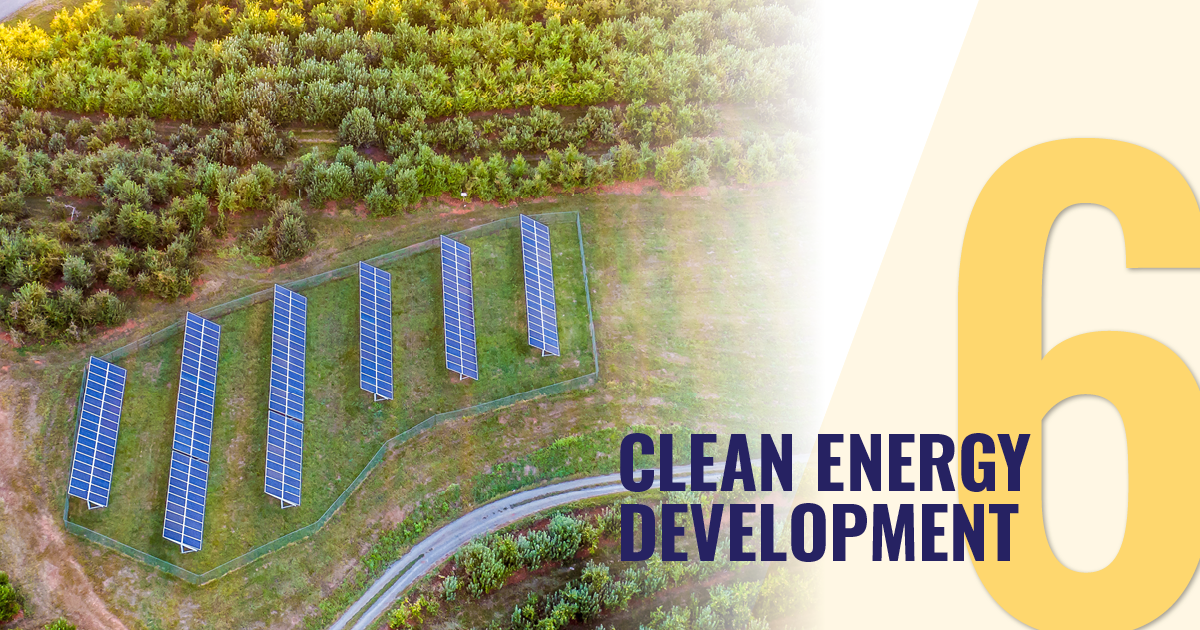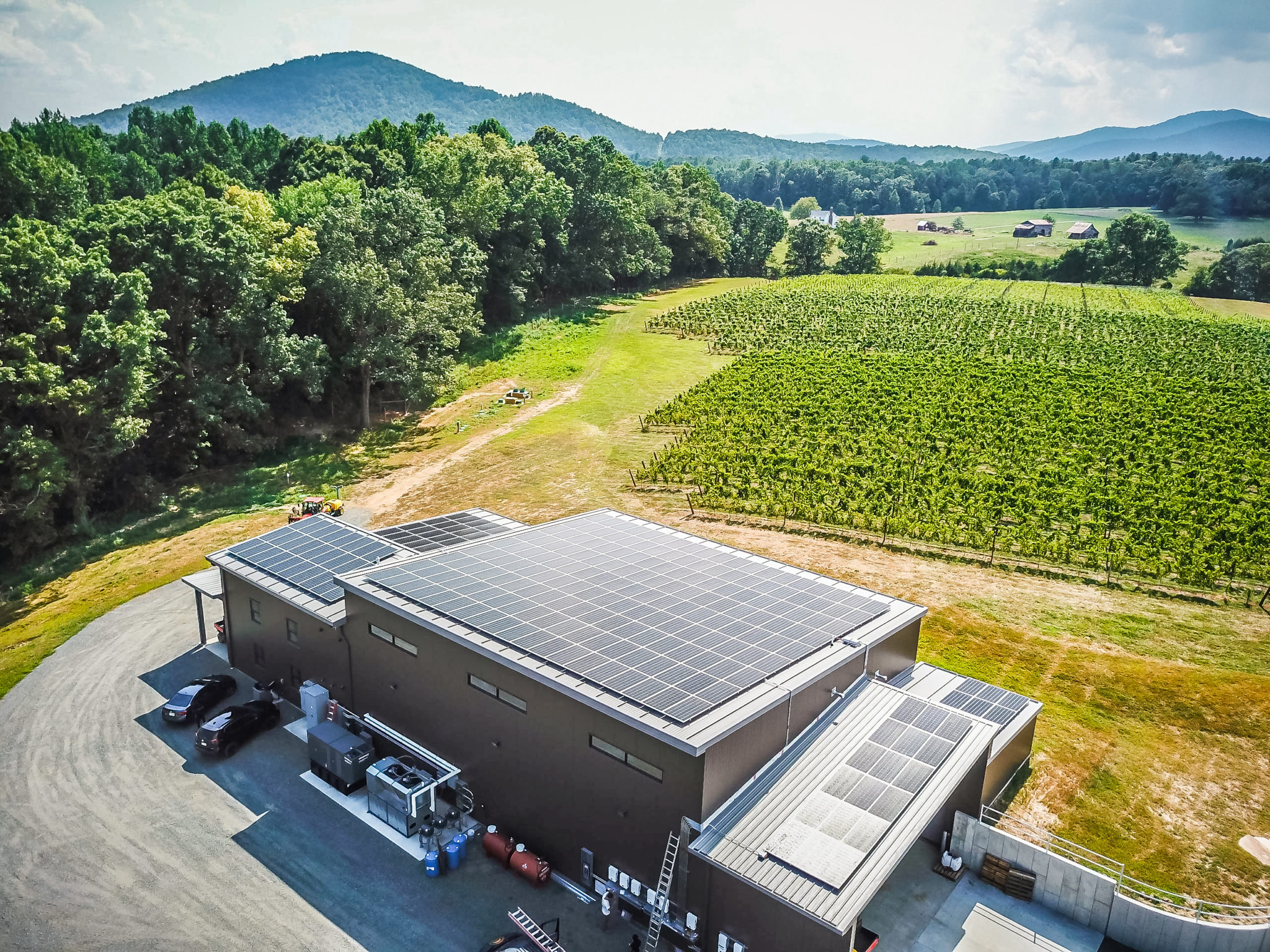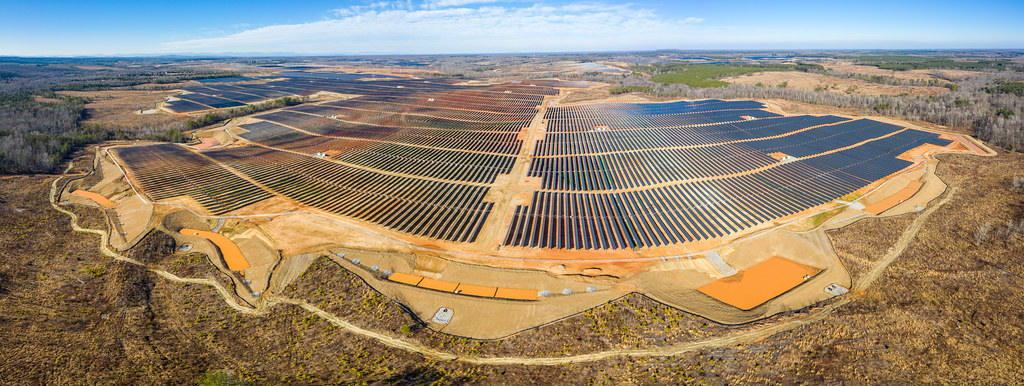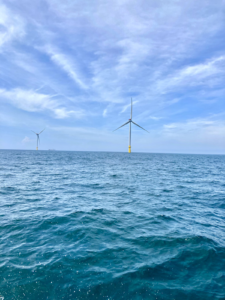
Welcome to the fifth week of the Our Common Agenda Education Series, featuring the Clean Energy Development chapter. Read below for the latest on Virginia’s upcoming policy on the responsible development of offshore wind, best practices in solar development, and ensuring an energy-efficient Commonwealth. While you’re at it, make sure to check out our other weeks of education here.
Building an Equitable Clean Energy Economy
As Virginia moves towards a clean energy future, we must prioritize supporting the people and communities that have been dependent on fossil fuels to ensure that they are not left behind. Virginia must optimize this moment to rebuild communities devastated by decades of fossil fuel dependency, connect impacted communities to new economic opportunities, and ensure that all environmental impacts of fossil fuels are remediated.
As we transition to a clean energy economy, we have the opportunity to revitalize these communities and prioritize people most impacted by the transition, while also growing the workforce to include historically overlooked communities. Our policy recommendations below ensure that the growing clean energy industry employs more of its workforce with a diverse Virginia workforce so that Virginia communities benefit from the growing clean energy economy.
Our policy recommendations
- Establish an Energy Transition Office within the Department of Housing and Community Development to work with transitioning communities to identify necessary resources, develop transition plans, and administer a Community Redevelopment Fund to support infrastructure projects in underserved communities.
- Require a JLARC Energy Transition Study to quantify the impacts of the fossil fuel industry decline and clean energy industry opportunities.
- Provide incentives for retraining programs and Green Career and Technical Education Dual enrollment programs.
- Expand Virginia Clean Economy Act requirements, shared solar, low-income solar rebates, and percentage of income payment programs to fossil-fuel impacted areas.
- Require power plant owners to develop and implement decommissioning plans to ensure environmental remediation.
Take a deeper dive into why Virginia needs to establish an Energy Transition Office in the opinion editorial by our Partners at Appalachian Voices, “Virginia’s New Governor Should Create Office of Just Energy Transition.”
Interested in learning more about growing Virginia’s energy workforce? Then check out the Energy Workforce Development Pathways Summit on October 21st. The Virginia Energy Workforce Consortium is bringing together industry leaders, educators, community organizers, and policymakers to discuss ensuring Virginia’s requirements to be 100% renewable by 2045!
Thank you to our Partners for their continued support for a clean energy economy: Appalachian Voices, Appalachian Citizens Law Center, and Chesapeake Climate Action Network.
Virginia’s Untapped Resource: Energy Efficiency
Efficiency—achieving the same output with less energy—lowers Virginians’ electric bills and rates, creates thousands of local jobs, and reduces the harms from energy-related pollution. Avoidable energy waste disproportionately hits low-income, Black, and Latinx residents. Efficiency is also one of our best climate action tools, both to lower upstream power plant pollution and to shift buildings away from fossil fuel. If we fully tapped efficiency technology, we’d reduce carbon pollution 50% by 2050.
Our Common Agenda recommends policy that expands access to energy efficiency by setting stronger energy efficiency targets and removing the restriction on the more efficient electrification of buildings and related infrastructure currently powered by polluting fossil fuels. Read all of our energy efficiency policy recommendations below:
Our policy recommendations
- Extend and strengthen the Energy Efficiency Resource Standard beyond 2025, including a low-income specific standard, so electric monopolies equitably lower pollution and bills while avoiding building far costlier power generators.
- Allow electric utilities to electrify buildings when doing so is more energy efficient than continued reliance on fossil fuels.
- Empower local governments to adopt “stretch codes” with stronger energy efficiency and climate standards.
- Allow local governments to require large building owners to make their buildings’ energy intensity public, for greater transparency of building efficiency and related tenant costs (“benchmarking”).
- Authorize the Virginia Department of Energy to establish minimum appliance efficiency standards exceeding Federal standards.
Want to take a deeper dive into the benefits of better energy efficiency? Check out the American Council for an Energy-Efficient Economy’s report, “States’ Climate Efforts Will Be More Costly, Less Equitable Without Stronger Efficiency Steps” to learn more!
And if you want to see how you can decarbonize your home through energy-efficient electrification, see RMI’s latest report!
Thank you to our Partners for their advocacy for an energy-efficient commonwealth: The Nature Conservancy, the Sierra Club Virginia Chapter, and the National Resource Defense Council.
Resilient Energy for Virginia Communities

With the Virginia Clean Economy Act, Virginia is poised to embark on a massive investment in large-scale solar and wind installations, and although such resources are necessary to decarbonize the power sector, such facilities suffer from the same reliability risks as other largescale power plants.
Small-scale energy resources, especially when paired with storage, are a necessary complement to larger resources. They improve grid reliability, reduce pressure on agriculture and forest land, and provide more jobs per megawatt compared to larger resources.
Virginia has recently made progress in bringing solar and storage to low-income communities – thanks to leadership from our Partners at the Virginia Environmental Justice Collaborative, Virginia will benefit from its first-ever Solar Powered Community Resiliency Hub, located in an historic district in the city of Petersburg.
However, we know this is only the first step. We recommend policy that removes barriers to customer-owned clean energy, strengthens the renewable portfolio standard, and promotes solar-plus-storage solutions for electricity resilience.
Our Policy Recommendations
- Expand the Dominion Energy shared solar program to all customers.
- Prohibit utilities from charging unreasonably high minimum bills for shared solar customers.
- Support solar-plus-storage for buildings that can serve as resilience hubs for communities.
- Increase the renewable portfolio distributed energy set-aside from 1% to 10%, and create a set-aside requirement for Appalachian Power.
- Increase low-income clean energy access with $2 million/year for the Clean Energy Advisory Board and $2 million/year for grants for schools in disadvantaged communities.
- Create a 25% investment tax credit for customer-owned renewables.
- Prohibit standby or demand charges that apply only to distributed generation customers.
Thank you to our Partners at Appalachian Voices, Lynnhaven River NOW, and Southern Environmental Law Center for their continued work to bring resilient energy to our communities!
Maximizing Benefits & Minimizing Impacts of Utility-Scale Solar
See the “Our Common Agenda” Policy Paper

Virginia’s use of electricity and reliance on largescale centralized power generation comes at a price. Even with the cleanest power generation projects, best practices should be employed to optimize energy output while minimizing environmental impacts. Utility-scale solar, by its very nature, uses many acres of land, which – if poorly developed – can unnecessarily harm primarily agricultural and forested lands.
While renewable energy projects must be used to meet the Commonwealth’s energy demand going forward, Virginia’s executive branch, General Assembly, and regulators should strive to minimize the environmental impacts while maximizing the benefits of solar. Our policy recommendations promote best practices for utility-scale solar:
Our Policy Recommendations
- Incentivize solar developers to use previously developed or degraded land, such as post-mining land, by funding the Virginia Brownfield and Coal Mine Renewable Energy Grant Program, offering bonus credits for brownfields projects within the Renewable Portfolio Standard and dedicating more resources to the Brownfields Program in order to better identify brownfields and assist developers with siting concerns.
- Provide funding for pilot projects that explore ways solar development can complement agriculture, demonstrating design, economic feasibility, and promotion of both dual use and community solar projects.
- Direct the Virginia Department of Energy, in coordination with relevant agencies and universities, to produce an annual Solar Status report tracking distributed, community, and utility-scale solar projects (applications, under construction, and in production) in order to evaluate consistency with state goals, including agricultural and forest land protection and water quality restoration targets. The report will track progress toward VCEA metrics and provide a foundation for future policy and program improvements.
Thank you to our Partners at Appalachian Voices and Piedmont Environmental Council for ensuring best practices in utility-scale solar development!
Development of Offshore Wind
See the “Our Common Agenda” Policy Paper
Virginia is on track to produce 5200 megawatts of offshore wind by 2035. With the generation of so much wind energy, Virginia is well on its way to confronting the climate crisis and realizing the creation of thousands of jobs supporting its industry.
Now, we must now ensure that offshore wind is done right, meaning it is brought online in a way that is fair, equitable, and beneficial for all Virginians. In particular, this means ensuring that the offshore wind job opportunities and training/educational programs are available, affordable, community-based, and widely promoted throughout the Commonwealth. It also means that offshore wind is responsibly sited, both offshore and onshore, with its transmission lines.
Our Policy Recommendations
- Enact policy that reflects the VCEA’s intent for diverse and equitable hiring, with specific and measurable goals. This would include requirements that Dominion submit diversity, equity, and inclusion plans, including a workforce diversity plan addressing all CVOW-related hires across construction and the supply chain as well as a supplier diversity program plan.
- Direct funds to be administered by departments under the direction of the Secretary of Commerce, to support clean energy workforce development programs that are accessible, affordable and community-based, and provide the funds necessary to promote those training opportunities to the specific communities outlined in the VCEA (i.e., historically disadvantaged communities, veterans, local workers).
- State natural resource agencies should use environmental review processes to require avoidance and minimization of impacts to offshore, nearshore, and onshore habitats, and compensation for the impacts that cannot be avoided.
Thank you to our Partners at Southern Environmental Law Center and the Sierra Club Virginia Chapter for supporting offshore wind development!

